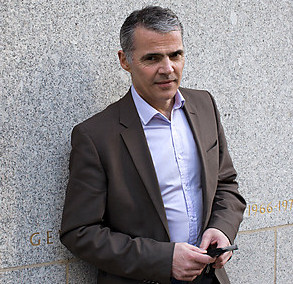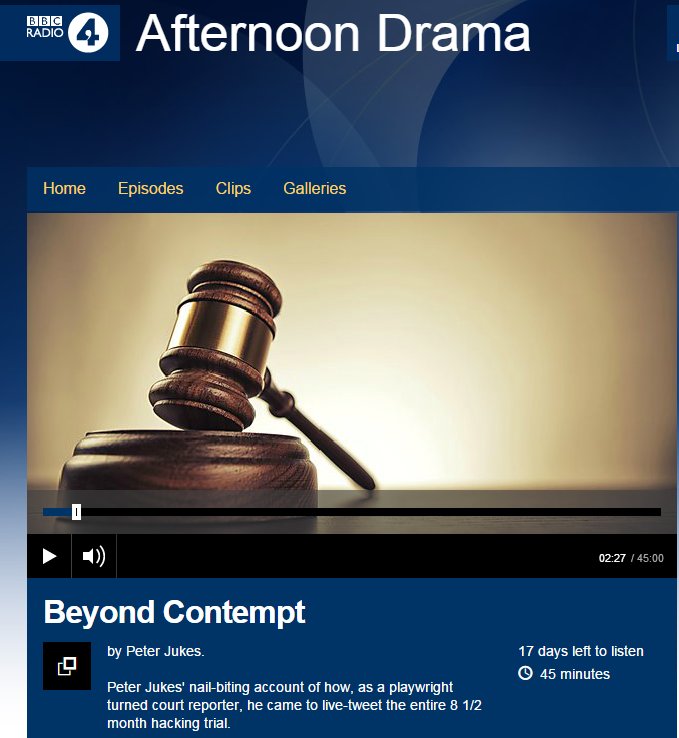Afternoon Drama: “Beyond Contempt” by Peter Jukes
Paul Magrath reviews a book and a play about the notorious phonehacking trial at the Old Bailey… Continue reading about Afternoon Drama: “Beyond Contempt” by Peter Jukes

At the end of it, Coulson and others were convicted; but Brooks was not, to the relief of some and the surprise of others. Coming so soon after the Leveson inquiry into press conduct and misconduct, it further fuelled calls for tighter regulation of the media. Everything about it seemed extravagant, and not surprisingly it was the topic of intense (if cannibalistic) media coverage.
Author and journalist Peter Jukes decided initially to cover the start of the trial, but having discovered that he would be allowed to issue live tweets from within the court (or its viewing annex) throughout the trial, he carried on. To cover his living expenses and mortgage payments, he resorted to crowdfunding: inviting financial support from amongst his thousands of followers, many of whom were only too happy to provide it.
The funding enabled him to turn his coverage into a book, Beyond Contempt, which was published shortly after the conclusion of the trial. But, with some experience of writing drama, Jukes also created this short (45-minute) radio play. It was broadcast on Radio 4 on 10 October, but it is still available to listen via iPlayer until 9 November.
I recommend you do so.
Though he cannot within the format of a 45-minute radio play hope to cover the full breadth of the trial and all the revelations that emerged throughout its eight month history, Jukes is able to give some flavour of what it was like to be there, witnessing legal history in the making. More personally, and perhaps uniquely, he can also tell us about experience as a reporter and tweeter, and about his relationship to the other journalists covering the case and some of the personalities involved (including some of the defendants, one of whom lends him an umbrella during a sudden downpour outside the court).
Among the reporters, two feature prominently in the drama. The first is Nick Davies, of the Guardian, who uncovered (and then covered) some of the most shocking incidents in the phonehacking scandal, including the revelation in July 2011 of the hacking into the mobile phone voicemail of the murdered schoolgirl Milly Dowler. Since the trial, he has released a book about it all, Hack Attack.
The other is James Doleman, of The Drum, who sits next to Jukes in court, in what he calls “bloggers’ corner”, and acts as a guide to the proceedings and a foil to Jukes’s sotto-voce commentary.
When Jukes sends out a tweet (typically they begin with BREAKING … and end with the hashtag #hackingtrial), Doleman comments “your tweets are going viral” or, in one case, “hey, you beat Nick Davies by 20 seconds!”
As a radio production, much of the scene-setting in the play is achieved by sound effects: the beep of security scanners at the entrance to the court, the tapping of keyboards, and the periodic “whoosh” of a sent-off tweet. When the lawyers’ exchanges are heard, it is from the distance of the public gallery (or via the sound system fed to the viewing annex) so they sound oddly detached. It’s almost as though you’re listening to someone watching something on the telly. But when the witnesses are ready to spill some beans, the mic moves in close and the drama comes alive. It is thus that we hear the ingratiating simper of Rebekah Brooks (sometimes portrayed as a passive-aggressive witch), or the “scatty” muddle-headedness of her PA, Sheryl Carter, both of whom were played by Jane Slavin; or the evidence of Jude Law and of Sienna Miller about her (mis)reported relationship with Daniel Craig; or the “how we did it” revelations of self-confessed hacker Dan Evans.
Some idea of how Jukes regarded the task of reducing the eight-month carnival of calumny and corruption into the span of a 45-minute radio play can be gleaned from his post on the BBC Radio 4 blog, part of which reads:
Modern courts are theatrical and full of drama, but not the typical drama one expects from TV and other fiction. There is tension, jeopardy, humour – barbed subtexts beneath the courtly language. But since the phone hacking trial was about major media figures, the media was to a certain extent itself on trial. A large part of the defence case was that Brooks and others could not get a fair hearing against the background of prejudicial comment, particularly in social media. Virtually every morning a defence barrister would rise and complain “My Lord, there’s been a Tweet”… [On one occasion it was Jukes’s and he had to delete it.]
Only radio could capture the pace and impact of this brave new world of online communication while remaining true to the theatrical traditions of the barristers’ benches.
I have two criticisms, only one of which relates to the play itself, but both of which betray an erroneous Americanisation of the English legal system – perhaps for the purposes of selling the production overseas. The first is about the BBC’s lazy and ignorant use of the gavel to illustrate the listing of the play. (see photo)
The other is the way the judge is constantly referred to as Justice Saunders. He isn’t. He’s MISTER Justice Saunders in England and Wales. That, by law, is his title. (Outside court, he is The Hon. Sir John Saunders.)
But these are minor quibbles and not things over which Jukes could have had much control. If Paris is worth a mass, then Beyond Contempt is surely worth a gavel.
